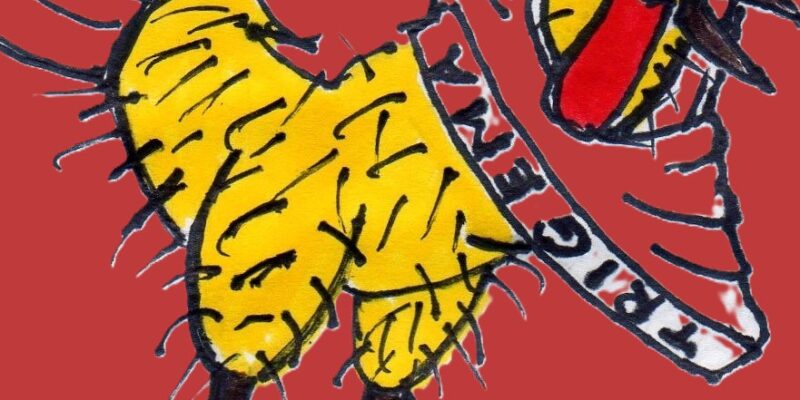Virtual and digital.
Wearing my Smoking – on the way to the Gala. Money has always fascinated me. Not only because you can buy everything with it, but also because it is something virtual with important functions and with immense strength and power. Money is a virtual commodity. It needs belief and symbols If you want it to fulfil its purpose, you actually need an almost absurd belief in the value of money. Because nobody wants to spend anything he values without getting something real and secure in return. Money will work as a currency if a huge collective unit accepts it as “valuable”. If you have no majority of people in a society who believe in it, then you can forget about it. In terms of architecture and functionality, money has two functions. First and foremost, money is a I. means of payment that simplifies the exchange of goods, perhaps even enables it. But it also has a second function that you want to strictly separate from the first. It is about money to be paid back in the future, generally also called “debts“, along with “providing“. II. Financing the present and providing for the future In this context, we now get the additional dimension of time. You can accumulate money in order to provide for your future. It is called saving. You can also try to improve the present at the cost of a future. In other words, I can buy and get and use something today but pay for it (a lot) later or in instalments. For instance because I have no money today but assume to have money tomorrow. For whatever reasons. This is how I can build a house with borrowed money. This is how you also generate income from capital or rights. All I have to do is find someone who believes me when I say that I will pay my debt back tomorrow, i.e. at a defined time in the future. Both – saving and borrowing – precludes that the currency will remain stable as time goes by. But that is seldom happening. However, before we deal with the phenomenon inflation, let us talk about interest. After all, this covering of time only became possible through interest. Now, if you owned more money than you needed (in other words, if you were rich), you could give the money you did not need to someone who needed it. This person (also called debtor) could buy what he needed and had to pay interest for being given money. And he could calculate how much more he had to pay for something he needs immediately. If you talk interest, you immediately also need to talk inflation. If, for instance, the inflation is higher than the interest rate, then you can become rich by indebting yourself – totally without any work. And this is how “the devil will always shit on a huge pile of shit”. In other words: poor and rich automatically build opposing poles. As I said earlier, money has always been a virtual commodity. It has often been represented by actual things (coins, paper notes). If you had these objects, you were able to take part in the property game. Typically, the objects were special things, like coins or paper. As civilization progressed, you could generate your own money. All you needed was the trust of your business partners. Laws and the debt tower improved your security. For instance, you could formulate debt contracts as bills of exchange and received goods against an unconditional pledge of payment for a certain time in the future. Today, we have less and less objects that represent money. This is how money becomes an entry in a global book that describes who the money belongs to. The global book is realized and kept by a complex banking system. It is called technological advance that this book is now no longer written on paper but digitally administered. With Blockchain technology, they now try to do this accounting in a digital, decentralized and global manner. In particular, they want to be independent from central service providers, mostly with camouflaged identities, which means the owners can register through their sw system and need not lay open their authenticity. Mostly, however, these currencies are still linked to state systems. And the money is administered by private enterprises, the banks. That makes sense, because historically, it has been assumed that countries cannot become bankrupt. After all, everything belongs to them and they can always take the money from their citizens. But in reality, it is the trust of the citizens in their country and its currency that carries the system. If this trust is no longer there, the currency can easily be dead. It happened several times in the past, and the consequences were always catastrophic. So modern currencies like the dollar, the Euro or the Renminbi can easily die. Even if it sounds unimaginable to us, it can easily happen. Without the function of money, business life is not imaginable. Mental experiment: What would happen in such an event? The answer seems simple. New currencies would have to come. The necessary requirement is that the people trust in them. Such a trust can best be generated in groups that share mental concepts. Nobody ever said these groups have to be state regulated. These communities should be huge. The biggest communities we find are those in the internet. Consequently, the idea that huge internet enterprises should carry these communities sounds logical. This is why I see a facebook currency (for example) in a different light. And I believe it would be a good idea if we prepared for such a currency. Simply to have something on standby if the dollar, the Euro, or the Renminbi (or all of them) will collaps. Let me be clear about this: It might happen that, in our country, currencies that we have discriminated against and fought, like the LIBRA, will suddenly become saviours of the world-wide business life. If, for instance, the three currencies collaps, where are we supposed to take our money? It might happen faster than we would like it to happen. Here is another difference between Libra and similar currencies and Bitcoin: When all is said and done, what facebook wants to do is organize a faith group currency. LIBRA will probably become a classical, purely digital antiquated currency. It has nothing to do with a crypto currency. Bitcoin is totally different – the distinctive criterion is that the owners are camouflaged behind their software and their registration and remain anonymous. However, it seems to me that anonymous property is not something we want in our society. And even with Bitcoin, you only get it in theory. If nobody else, then at least the miners prevent it. nd here is a cynical question: I could easily imagine the catholic church as provider of an internet currency. There are still many people who trust in it – and there is a great argument in favour of such a provider – the enterprise has 2,000 years of success behind it. RMD




